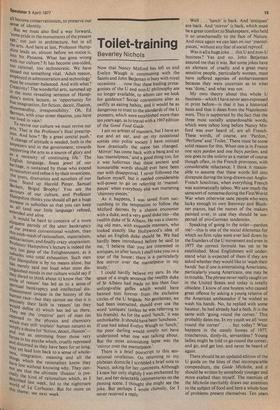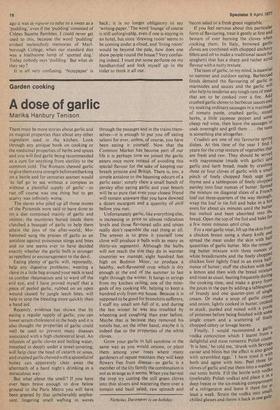Toilet-training
Beverley Nichols
Now that Nancy Mitford has left us and Evelyn Waugh is communing with the Saints and John Betjeman is busy with royal occasions. . now that these leading protagonists of the U and non-U philosophy are no longer available, to whom can we look for guidance? Social conventions alter as swiftly as eating habits, and it would be as dangerous to trust to the standards of the U pioneers, which were established more than ten years ago, as to travel with a 1967 edition of the Good Food Guide.
I am no arbiter of manners, but I have an eye and an ear, and on my occasional sorties into polite society I have noticed how drastically the scene has changed. 'Mirror' has come back with a bang and so has 'mantelpiece,' and a good thing too, for it was ludicrous that these ancient and honourable words should ever have been met with disapproval. I never followed the fashion myself, but it needed considerable will-power to go on referring to 'mantelpieces' when everybody else was muttering 'chimney-pieces.'
As it happens, I was saved from succumbing to the temptation to follow the Mitford decrees by a chance encounter with a duke, and a very good duke too—the twelfth duke of St Albans. He was a charming old man, with exquisite manners, who looked exactly like Hollywood's idea of what an English duke should be. We had hardly been introduced before he said to me, 'I believe that you are interested in antiques, so after lunch I shall take you on a tour of the house; there is a particularly fine mirror over the mantelpiece in my study.' I could hardly believe my ears. In the space of a single sentence the twelfth duke of St Albans had made no less than four unforgivable gaffes which would have banned him forever from the exclusive circles of the U brigade. No gentleman, we had been instructed, should ever use the word 'antiques' (unless he was referring to his friends). As for the word 'lunch,' it was unthinkable. It should have been 'luncheon.' If one had asked Evelyn Waugh to 'lunch,' the poor darling would simply not have understood what one was talking about. But the most astonishing lapse was the 'mirror over the mantelpiece.'
There is a brief postscript to this sensational revelation. On returning to my plebeian domicile I scribbled a brief note to
Nancy, asking for her comments. Although I knew her only slightly I was enchanted by
her, and her delectable commentaries on the passing scene. I thought she might see the joke. But perhaps I wrote clumsily, for I never received a reply. Well. . . 'lunch' is back. And 'antiques' are back. And 'mirror' is back, which must be a great comfort to Shakespeare, who held it so unashamedly to the face of Nature. And once again we can lean on our 'mantelpieces,' without any fear of social reproof.
Was it all a huge joke ... this U and non-U business? Yes and no. John Betjeman assured me that it was. But some jokes have an element of cruelty and a great many sensitive people, particularly women, must have suffered agonies of embarrassment because they were uncertain as to what was 'done,' and what was not.
My own theory about this whole U business—which I have never seen expressed in print before—is that it has a historical basis and that it dates from the Napoleonic wars. This is supported by the fact that the three most socially unpardonable words, which were taboo long before Nancy Mitford was ever heard of, are all French. These words, of course, are 'Pardon,' 'Perfume' and 'Toilet.' There must be some solid reason for this. When one is in France one says pardon and one buys parfurn, and one goes to the toilette as a matter of course though often, in the French provinces, with considerable reluctance. I think it reasonable to assume that these words fell into disrepute during the long-drawn-out AngloFrench hostilities, when everything French was automatically taboo. We saw much the samesort of nonsense during the First World War when otherwise sane people who were lucky enough to own Steinway and Bluthner pianos, had the names of the makers painted over, in case they should be suspected of pro-German tendencies.
Speaking of going to the toilet—pardon me!—this is one of the social dilemmas for which no firm rules were ever laid down by the founders of the U movement and even in 1977 the correct formula has yet to be established. Most Englishmen will understand what is expected of them if they are asked whether they would like to 'wash their hands' but if one is entertaining Americans, particularly young Americans, one may be in trouble. The phrase never really caught on in the United States and today is totally obsolete. I know of one hostess who caused great offence by asking a young relative of the American ambassador if he wished to wash his hands. No, he replied with some hauteur, he had already had a bath. It is the same with 'going round the corner.' This probably dates me. In my youth we all 'went round the corner' . . . but today? What happens in the stately homes of 1977, treacherous, dimly-lit, servantless? Young ladies might be told to go round the corner, and go, and get lost, and never be heard of again.
There should be an updated edition of the U guide on the lines of that incomparable compendium, the Guide Michelin, and it should be written by somebody younger and more exalted than myself. The mention of the Michelin inevitably draws our attention to the subject of food and here a whole host of problems present themselves. Ten years ago it was de rigueur to refer to a sweet as a 'pudding,' even if the 'pudding' consisted of Crepes Suzette flambees. I could never get used to this, because the word 'pudding' evoked melancholy memories of Marlborough College, when our standard diet was a loathsome lump of 'spotted dog.' Today nobody says 'pudding.' But what do they say?
It is all very confusing. 'Notepaper' is back; it is no longer obligatory to say 'writing-paper.' The word 'lounge' of course is still unforgivable, even if one is staying in an hotel, but since 'drawing room' seems to be coming under a cloud, and 'living room' would be beyond the pale, how does one show people round the house? Very confusing indeed. I must put some perfume on my handkerchief and lock myself up in the toilet to think it all out.

































 Previous page
Previous page